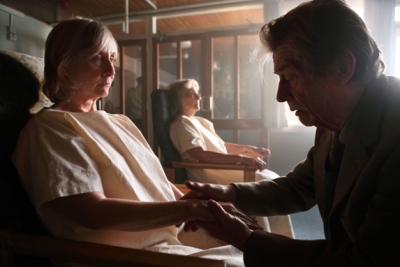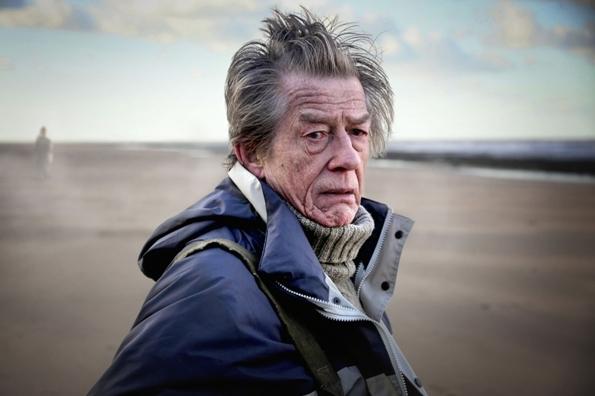Television has been very good to MR James. The originator of the “antiquarian ghost story” - his plots often hinge on some stumbled-upon medieval relic - his spooky tales are certainly vivid and engaging. Yet he himself professed to never taking them terribly seriously: they were written as “entertainments", to be read out loud to a convivial circle of admiring undergraduates during his years as a Cambridge don.
Yet what television has managed do to with these short Edwardian tales is to lend them considerable psychological weight: are the visitations real or imagined? Are they expressions of guilt, or longing? Or are they the impulses of a whole host of other inchoate or suppressed feelings? These psychological tremors are heightened in a shockingly edgy, often dream-like atmosphere, and the original stories, as good as they are about things that go bump in the night, really don’t possess any of that. And so television has done the reverse of what it usually does with text: not stripped it of layers of subtle meaning, but added layers.
The current BBC adaptation of James’s classic ghost story Whistle and I’ll Come to You still lives in the televisual shadow of a much earlier BBC adaptation. Directed by Jonathan Miller in 1968, and starring the unsurpassable Michael Hordern as the fusty old rationalist academic James Parkin - “there are more things in philosophy than are dreamt of in heaven and earth” he jokes before the horrors begin to unfold - it has a denouement so genuinely unsettling that you’ll probably have a thing about bed linen for many nights to come.
Watch opening clip of Jonathan Miller's Whistle and I'll Come to You
So I was left in two minds about last night’s version, which was adapted by Neil Cross and starred John Hurt, an actor who possesses a wretchedly haunted and hunted air in whatever he appears in. I’m no purist when it comes to plot, but James’s tale could hardly be discerned in this modern retelling (though you might argue that the author’s plotlines have become such generic ghost-story fodder that changes of detail hardly matter). Instead of being a bachelor academic, Hurt’s Parkin was a married academic astronomer recently retired - how he must get irritated by those who tell him their star signs, and the adaptation had fun with this common confusion - who had just delivered his wife into a care home after several decades of what looked to be a blissfully happy partnership.
 Parkin’s wife (Gemma Jones, pictured right), suffering from some kind of dementia, appeared in an unblinking catatonic state almost throughout, completely unresponsive to husband or ministering nurse. The nurse, meanwhile, smiled in such a sweet and benign fashion that you immediately suspected fishy goings-on. There were other clues to raise suspicions: the saintly nurse appeared to be the only member of staff who was ever on duty – always a bad sign - and the other elderly residents, all identically kitted out in their flimsy hospital gowns (why had their clothes been taken away?) all looked as if they’d been body-snatched, too. But in the end all this turned out to be a red herring – or did it?
Parkin’s wife (Gemma Jones, pictured right), suffering from some kind of dementia, appeared in an unblinking catatonic state almost throughout, completely unresponsive to husband or ministering nurse. The nurse, meanwhile, smiled in such a sweet and benign fashion that you immediately suspected fishy goings-on. There were other clues to raise suspicions: the saintly nurse appeared to be the only member of staff who was ever on duty – always a bad sign - and the other elderly residents, all identically kitted out in their flimsy hospital gowns (why had their clothes been taken away?) all looked as if they’d been body-snatched, too. But in the end all this turned out to be a red herring – or did it?
After he had settled his wife in the home, the nurse encouraged Parkin to take himself away for a few days – which may have been another tell-tale sign that things were not quite right in that place. So he booked into a hotel on some flat, isolated coastline, and if the prospect of a haunting wasn’t immediately apparent to him as soon as he entered reception (the hotel looked as if it had barely been touched by the 20th century, let alone the 21st) it was immediately apparent to us. During a walk along the stretch of rugged beach - naturally this was out of season - he stumbled upon some glinting object: a ring, a wedding ring, in fact (not the ancient bronze whistle of the original tale that, when played, summons a “crumpled linen” spook) on which he reads a curious Latin inscription. So when things start going bump, or in this case, scratch-scatch upon the floorboards that night, and the wind angrily howls, should we think that he is simply being tormented by the guilt of his marital "abandonment"?
Parkin’s scientific rationalism, however, still remains an integral part of this story. “A body that has outlasted the existence of the personality, that is far, far more horrifying than any spook or ghoul that you could ever hope to glimpse, believe me," he tells the receptionist. Naturally, it's a conviction that will be sorely tested to its limits.
This was, overall, a beautifully shot, strange and atmospheric retelling of a classic ghost story and if the shocking denouement didn't give you the frights, then you're made of sterner stuff than me. So why did it leave a residue of mild dissatisfaction? Perhaps because it relied a little too heavily on the conventions of Hollywood/Stephen King fright-fests - that awfully weird care home again. Why mess so much with such a classic of English spookery?
- Watch Whistle and I'll Come to You on BBC iPlayer
- Find DVDs of Whistle and I'll Come to You, directed by Jonathan Miller, on Amazon
- Buy the Complete Ghost Stories of MR James on Amazon















Add comment